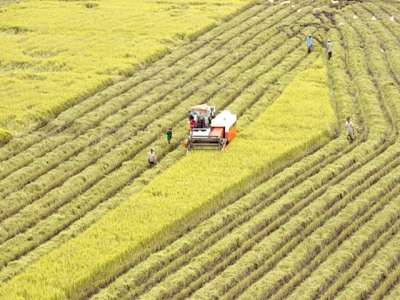Sustainable agriculture projects raises farmers profits and production

HÀ NỘI — More than 800,000 farmers in the Cửu Long (Mekong) Delta provinces have benefited from the Vietnam Sustainable Agriculture Transformation (VnSAT) project, which has helped increase their annual income and production.
Farmers harvest rice in Vị Thủy District, Hậu Giang Province. — VNA/VNS Photo
Under the project, the high-tech rice farming area increased from 84.766ha in 2018 to 150,000ha by July this year, four years after implementing the project, according to deputy minister of Agriculture and Rural Development Lê Quốc Doanh.
The rate of high-quality rice cultivation has increased to 75-80 per cent, even 90 per cent in some localities thanks to applying advanced technology, he said.
Profits of farmers, who take part in the project, has increased by nearly 10 per cent compared to farmers who have not joined the project.
More than 800,000 farmers received training on the new rice cultivation technique ‘three reductions, three gains’ (3R3G) and have learned about the ‘one must, five reductions’ (1M5R) method.
3R3G refers to reductions in seed, chemicals, and water; and gains in productivity, quality, and economic efficiency. 1M5R means using registered seeds and reductions in seed, chemical fertiliser, pesticide, water use, and post-harvest loss.
VnSAT began in 2017 in seven provinces: An Giang, Đồng Tháp, Hậu Giang, Kiên Giang, Long An, Sóc Trăng and Tiền Giang, as well as Cần Thơ City.
The project aims to support a large-scale program of improving agronomic practices and management, supporting private sector investments in upgrading rice processing technology and facilities for high value and quality rice, and improving public service delivery.
With total capital of US$301 million provided by the World Bank, the Vietnamese Government and the private sector, the project aims to use advanced technology in rice production on 200,000ha for 140,000 households, raising profits by 30 per cent per ha.
Speaking at the workshop on Tuesday to review consultancy activities of the International Rice Research Institute (IRRI) for VnSAT project, deputy minister Doanh said the Ministry of Agriculture and Rural Development (MARD) highly appreciated IRRI's contribution.
IRRI's support for capacity building, technical assistance, sustainable farming practices, climate change mitigation and rice value chain enhancing has helped increase productivity and profitability for farmer associations.
He said these contributions have been receiving many positive responses from the World Bank, project management boards and farmers, adding that they expect IRRI to continue replicating these results in the future.
In the face of opportunities and challenges from Free Trade Agreements, Việt Nam needs to continue to increase rice's added value and build a brand for Vietnamese rice.
The ministry wants to continue cooperating with IRRI on rice variety research, capacity building, policy advice and exchange of scientific and technical advances, contributing to the development of the rice production industry and food security in Việt Nam, said Doanh.
IRRI continues to be an important partner of the Government of Việt Nam in building a dynamic agricultural economy with the participation of farmers, as well as in solving current problem such as responding to climate change and improving the reputation and quality of Việt Nam's rice exports, the deputy minister said.
Related news
 Hi-tech agricultural production reaches vigorous growth
Hi-tech agricultural production reaches vigorous growth Defining that hi-tech agriculture will promote many other industries, Dau Tieng district has drastically taken solutions to impulse production-business
 Vietnam’s door to export rice to UK market wide open
Vietnam’s door to export rice to UK market wide open The impending UK-Vietnam Free Trade Agreement (UKVFTA)’s incentives might assist Vietnamese rice exporters in increasing their market share in the UK.
 Scientists help farmers save money with locally made drones
Scientists help farmers save money with locally made drones Tran Phi Vu, PhD in UAV, and Pham Thanh Toan, MA in Deep Learning, are two of the 14 names nominated by VietNamNet as Inspiring Characters in 2020.